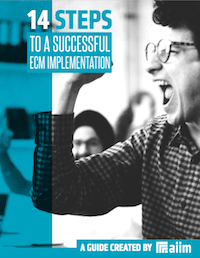The AIIM Blog
Keep your finger on the pulse of Intelligent Information Management with industry news, trends, and best practices.
Artificial Intelligence (AI) | Electronic Records Management (ERM) | Machine Learning
It sometimes feels like the battle for control of unstructured data is being won by the forces of employee document hoarding and data over-retention. The unchecked growth of files, emails, and other content drives up online storage costs, undermines privacy-driven data minimization efforts, increases eDiscovery risks and expenses and, perhaps most importantly, chokes employee productivity and collaboration.
Share
AIIM on Air | Machine Learning
In this episode of AIIM On Air I am joined by Greg Council, VP Marketing and Product Management at Parascript. Greg is a member of the AIIM leadership council and an expert in digital transformation using tools like advanced data extraction, taxonomy, and search.
Share

Making an ECM implementation successful requires planning and attention to detail. The best way to create the right solution is to identify organizational goals and priorities. Learn how to manage a successful implementation in our free guide.
Artificial Intelligence (AI) | Machine Learning
This is the third part of a 3-part series on the Ethical Use of Data for Training Machine Learning Technology by guest authors Andrew Pery and Michael Simon. You can also check out Part 1 and Part 2 from this series. Part 3: Regulatory Efforts in the U.S. Present a Bleak Perspective In the United States, governmental efforts to examine AI have made far less progress as compared to the E.U. The most recent effort at the federal level, the Algorithmic Accountability Act of 2019 (S.1108) sponsored by Senator Ron Wyden (D-OR) and Senator Cory Booker (D-NJ)(with a parallel House bill, H.R.2231, sponsored by Representative Yvette Clark (D-NY)), seeks "To direct the Federal Trade Commission to require entities that use, store, or share personal information to conduct automated decision system impact assessments and data protection impact assessments." The proposed law would require the Federal Trade Commission to enact regulations within the next two years to require companies that make over $50 million per year or collect data on more than 1 million people to perform an "automated decision system impact assessment." However, unlike the GDPR's transparency requirements (no matter how debatable), the proposed bill would not require those assessments to be made public. Despite this lack of a transparency provision, the bill was quickly endorsed by a number of civil rights groups.
Share
Artificial Intelligence (AI) | Machine Learning
This is the third part of a 3-part series on the Ethical Use of Data for Training Machine Learning Technology by guest authors Andrew Pery and Michael Simon. You can also check out Part 1 and Part 2 from this series. Part 2: The Ethical and Legal Challenges of AI The AI technology bias and its potentially unintended consequences is gaining the attention of policymakers, technology companies, and civil liberties groups. In a recent article based upon an ABA Business Law Section Panel: Examining Technology Bias: Do Algorithms Introduce Ethical & Legal Challenges? The panelist-authors noted that:
Share
Artificial Intelligence (AI) | Machine Learning
This is the third part of a 3-part series on the Ethical Use of Data for Training Machine Learning Technology by guest authors Andrew Pery and Michael Simon. You can also check out Part 1 and Part 2 from this series. Part 1: Bad Things Can Come from Non-neutral Technology AI technology is becoming pervasive, impacting virtually every facet of our lives. A recent Deloitte report estimates that shipments of devices with embedded AI will increase from 79 million in 2018 to 1.2 billion by 2022: "Increasingly, machines will learn from experiences, adapt to changing situations, and predict outcomes…Some will infer users' needs and desires and even collaborate with other devices by exchanging information, distributing tasks, and coordinating their actions."
Share
AIIM on Air | Artificial Intelligence (AI) | Machine Learning
No matter where you turn, it seems you can't help but run into discussion about Artificial Intelligence being the future of Intelligent Information Management. In fact, when we surveyed the AIIM Community about it and found that 81% of organizations reported that Deep Learning and Machine Learning are key to their future technology and business planning.
Share